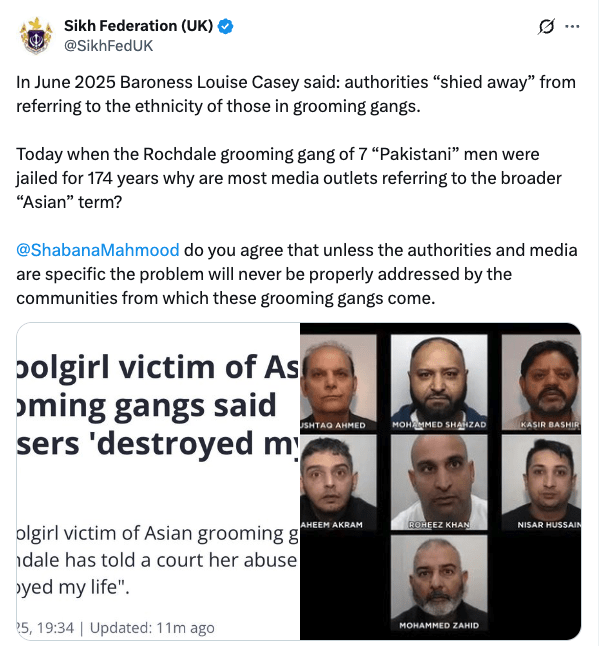AI Generated Summary
- The UK-based pro-Khalistani group Sikh Federation UK (SFUK) has strongly objected to the use of the term “Asian” by British media outlets in reports on the conviction of seven Pakistani men involved in the Rochdale grooming gang case.
- Despite the case’s gravity and specificity, several media reports described the perpetrators as “Asian men” — a term SFUK says unfairly generalizes and stigmatizes an entire continent’s communities.
- As the debate reignites, pressure is likely to grow on media organizations and government officials alike to balance accuracy, fairness, and social cohesion in how they frame such stories.
The UK-based pro-Khalistani group Sikh Federation UK (SFUK) has strongly objected to the use of the term “Asian” by British media outlets in reports on the conviction of seven Pakistani men involved in the Rochdale grooming gang case.
The men were convicted in June 2025 for the systematic sexual exploitation of two teenage girls between 2001 and 2006 in Rochdale, North England. Despite the case’s gravity and specificity, several media reports described the perpetrators as “Asian men” — a term SFUK says unfairly generalizes and stigmatizes an entire continent’s communities.

SFUK Calls for Accurate Ethnic Identification
In a statement shared on social media on October 1, SFUK urged British journalists and officials to use precise terminology when reporting such crimes. “The perpetrators were Pakistani men, not ‘Asian men,’” the organization emphasized, adding that the blanket term obscures responsibility and contributes to negative stereotyping of British Sikhs, Hindus, and other Asian-origin communities who have no connection to these crimes.
SFUK further called on newly appointed Home Secretary Shabana Mahmood to confront what it described as a “systemic failure” in addressing grooming gang crimes. The group argued that avoiding clear ethnic identification undermines efforts to understand and tackle the root causes of such exploitation.
A Wider Debate on Language and Accountability
The controversy reflects a broader, ongoing debate in the UK about media responsibility and ethnic terminology. Critics of the “Asian” label, including politicians and community leaders, argue that it masks cultural patterns specific to certain groups while unfairly tarnishing others.
By contrast, defenders of the broader term claim it avoids inflaming racial tensions and ensures coverage remains sensitive and inclusive.
SFUK’s intervention highlights how identity politics, community representation, and accountability intersect in the UK’s public discourse — particularly in sensitive criminal cases involving ethnicity and religion.
As the debate reignites, pressure is likely to grow on media organizations and government officials alike to balance accuracy, fairness, and social cohesion in how they frame such stories.




